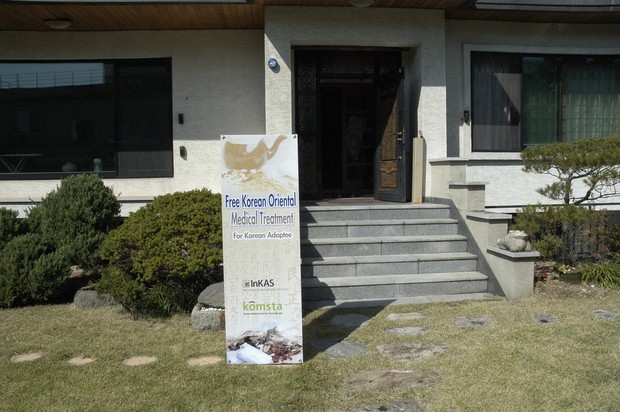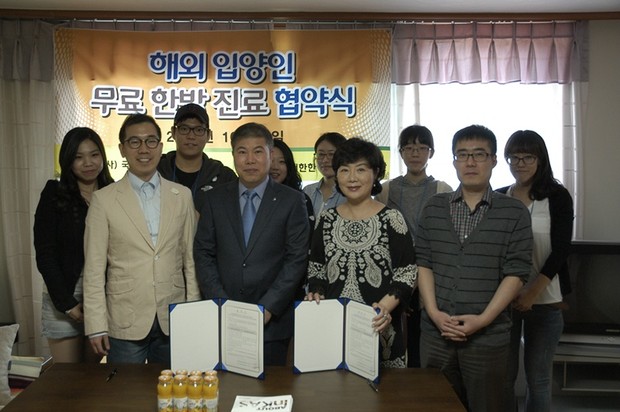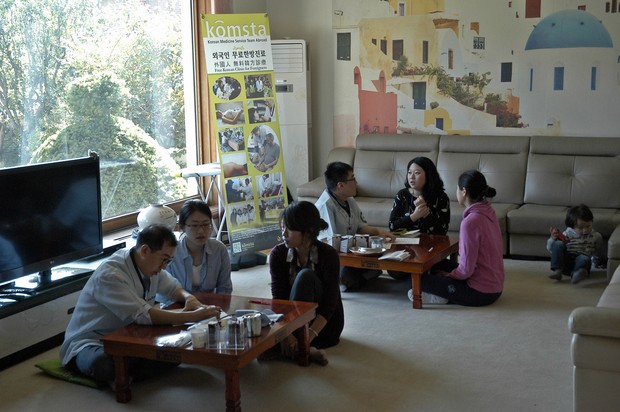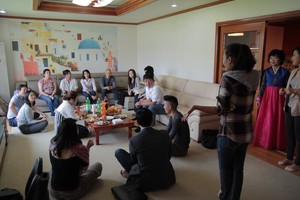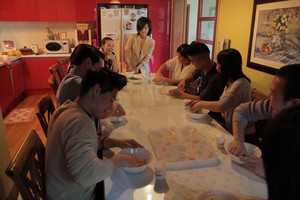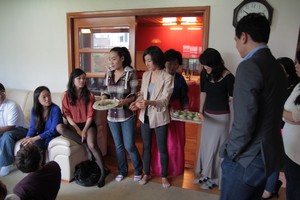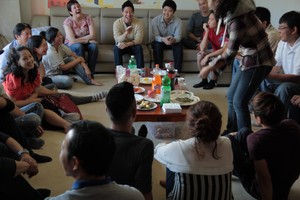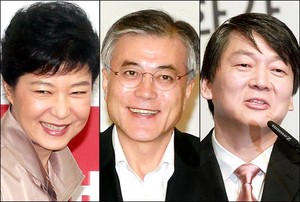
The 18th Republic of Korea presidential election
will be held in South Korea on 19 December 2012. It will be the
sixth presidential election since democratization
and the establishment of the Sixth Republic, and will be held under a first-past-the-post system, meaning that there
will be a single round of voting and the candidate receiving the highest number
of votes will be elected. Under the South Korean constitution, presidents are
restricted to a single five-year term in office, and the term of incumbent
president Lee Myung-bak will end in February 2013.
Registration for candidacy began on 23 April 2012.
Lee Myung-bak
was elected President of South Korea in 2007 as the
nominee of the conservative Grand National Party after a closely
contested primary
in which he narrowly defeated Park Geun-hye,
and assumed office in February 2008. His victory brought to a close ten years
of liberal administration under Kim Dae-jung
and Roh Moo-hyun.
The Lee Myung-bak government pursued the
reduction of government bureaucracy and a laissez-faire
economic policy, and came under criticism from the left for political scandals and controversial
policies such as the Jeju-do Naval Base and its support of the South Korea-United States Free Trade
Agreement, although both were initiated under the previous
administration. Despite the fact that he was elected in a landslide
victory and received initial approval ratings of 70%, Lee's ratings
had declined to below 30% by 2012.
At
the end of 2011, Park Geun-hye assumed control of the Grand National Party,
which was subsequently renamed the Saenuri
or New Frontier Party in February 2012. She distanced herself from Lee and led
the party towards the center. In legislative elections in
April 2012, Park guided the party to an upset victory, returning its majority
in the National Assembly. This contributed to an increase in her poll
ratings and consolidated her position as frontrunner for the Saenuri
nomination.
Opposition
to Saenuri is divided primarily between the Democratic United Party and independent supporters of Ahn Cheol-soo,
who has emerged as a leading potential candidate despite his ostensible silence
on the race.
In the DUP, focus initially lay on Sohn Hak-kyu
as a potential nominee, but by late 2011 Moon Jae-in,
a confidant of former president Roh, had overtaken Sohn in polls.
Although the DUP invited Ahn to join the party,
only 2.3% of respondents to a poll on 21 April thought that Ahn was best suited
to be DUP nominee.
The DUP itself has been troubled by the split between pro-Roh members such as
Moon Jae-in and the "Honam wing" of former president Kim Dae-jung,
represented by Chung Dong-young.
Ann
Cheol Soo
Ahn Cheol-soo is a South Korean
business person,
politician,
and former professor.
He founded AhnLab, Inc.
an antivirus software company, in 1995. Until
September 2012, Ahn was the dean of the Graduate School of Convergence Science
and Technology at Seoul National University and also serves
as chairman
of the board of AhnLab and its Chief Learning Officer, and chairman of
the board of Noritown Studio, originally an internal corporate venture of
AhnLab, now operating as a separate entity. Ahn was born on February 26, 1962
in Busan,
South Korea.
He earned his MD, MS
and PhD in physiology
at Seoul National University. He individually
researched computer antivirus software programs while at Seoul
National University Hospital and Dankook University Hospital, and founded venture after resigning from his medical
duties. Later AhnLab Inc became the largest computer
security company in South Korea, and has been included in recent
annual lists of the Korea's most admired companies by Korea Management
Association Consultants (KMCA).
In
early September 2011, speculation spread that Ahn would enter politics by
competing in the October 26 Seoul mayoral by-election. Analysts say that if
positioned as an independent, Ahn would attract a degree of support from those
disaffected by mainstream political parties in the wake of corruption
allegations and continuing policy failures. As a medical doctor, professor,
self-taught computer entrepreneur, and corporate leader, Ahn is representative
of everything mainstream Korea dreams of becoming. Ahn's political motivation is very similar to Roh Moo-hyun-led
populism in 2002. He alluded to becoming the nominee for the president via his
book 'Thought of Ahn Cheol-Soo'.
On September
19, 2012 at 3pm KST, Ahn held a press conference and announced his intention to
run for the 2012 Presidential election.
This announcement came after months of speculation on whether or not Ahn was
going to run for the presidency. The South Korean presidential election will be
held on December 19, 2012. In the address that lasted around 20 minutes, Ahn
spent a considerable amount of time on how he came to the decision to run for
the president of the Republic of Korea, quoting the people that he met during
the time of discernment for the presidency that expressed their strong urge for
the "new politics".
Moon Jae In
Moon Jae-in is a South Korean lawyer and the former chief of
staff to late President Roh Mu-hyun. On September 16, 2012, Moon was
elected as the Democratic United Party's candidate for
the 2012 presidential elections
after winning a majority in the party primaries.
Born in Geoje, South Korea,
Moon Jae-in was the first son. His father was a refugee from North Korea
that fled his native city of Hamhung during the Hanghung Retreat. His father settled in
Geoje as a laborer for Geoje POW Camp. He attended Gyoungnam High
School, considered among the most prestigious school outside Seoul. He enrolled
to Kyunghee University majoring in law. He was
arrested and expelled from the university when he organized a student protest
against Yushin Constitution. Later, he was forcibly conscripted
to the military and recruited to the Special Forces where he
participated in a military mission during the Axe murder incident. After discharge, he passed
the Bar Exam
and was admitted to the Judicial Research and Training Institute. He graduated
second in the institute and despite his superb academic record he was not
admitted to become a judge due to his student protests. He chose to become a
lawyer instead.
Despite his
earlier indifference to politics, he changed his reluctance and began to get
involved in the politics. He published a memoir called "The Destiny of
Moon Jae-in" which became a bestseller.
His popularity has been rising steadily. In the February 2012 Poll, Moon gained
parity with Park in popularity.
Moon managed to capitalize on the conservatives' decline in popularity amid a
series of corruption scandals as one pundit said "Moon had managed to
portray himself as a moderate and rational leader who has the backing of the
younger generation".
In early 2012, Moon entered a bid for a seat at National Assembly and has been
campaigning in western Busan.
Park Geun Hye
Park Geunhye is a South Korean politician. She was the chairwoman
of the conservative Grand National Party (GNP) between 2004
and 2006 and between 2011 and 2012 (the GNP changed its name to "Saenuri Party"
in February 2012). Park is a member of the Korean National Assembly
who had served four consecutive parliamentary terms as a constituency
representative between 1998 and 2012, and started her fifth term as a
proportional representative from June 2012. Her father was Park
Chung-hee, president of South Korea from 1963 to
1979.
Park was
elected a Grand National Party (GNP) assemblywoman
for Dalseong,
Daegu in 1998 by election, and elected three more times in the same electoral
district between 1998 and 2008, being the incumbent assemblywoman till April
2012. In 2012, Park announced that she would not run for a constituency
representative seat for the 19th election in Dalseong or anywhere else, but for
a proportional representative position for the Saenuri Party instead, in order
to lead the party's election campaign. She was elected as a proportional
representative in the April 2012 election.
Park hoped to
emulate her father's success by becoming the presidential nominee of the Grand National Party. She eventually lost
to Lee Myung-bak
by a narrow margin. Lee had a commanding lead at the beginning of the primary
season, but Park was able to narrow the gap through allegations of Lee's
corruption. Park won the "party member's bid", but she lost the
"national bid" which is a larger percentage of the total presidential
bid.
Park
has been the leading candidate for the 2012 presidential election
in every national-level poll in South Korea between 2008, when Lee Myung-bak
administration began, and September 2011. Park's approval rating was highest
when 2008 National Assembly election showed her strong influence and lowest in
early 2010 as a result of her political stance against Lee administration in Sejong City
issue.
On
July 10, Park formally announced her 2012 presidential bid at the Time Square, Yeongdeungpo-gu,
Seoul. In this event she emphasized the right to pursue happiness, democratic
economy, and customized welfare services for Korean people.
_big.jpg)
